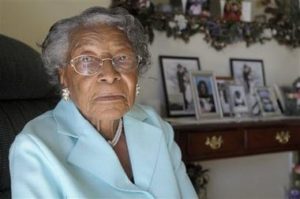
Recy Taylor, 97, received an apology from the Alabama legislature in 2011 for its failure to prosecute her attackers. (AP Photo/Phelan M. Ebenhack)
Recy Taylor, an African-American woman from Abbeville, Ala. who was kidnapped and gang-raped by four white men in 1944, passed away peacefully Thursday morning, according to a family member. She’s survived by a brother, two sisters, one granddaughter and multiple great-grandchildren.
Sunday, Dec. 31, would’ve marked her 98th birthday.
“[She was] a brave woman and a fighter, who’d tried her best to get it known all over the world,” Taylor’s brother, Robert Corbitt, told NBC News in a phone interview from Alabama.
Taylor, who was 24 years old at the time, was walking home from church on the evening of Sept. 3, 1944, when a group of armed white men abducted her from her friends and took her to a grove on the side of the road where they took turns sexually assaulting her. She was them left blindfolded along the road.
Taylor was threatened with death if she dared to tell what happened to her, but she took her story to police anyway.
The gruesome attack made headlines in the Black press and served as an early catalyst in what would become the civil rights movement, The New York Times reported. The NAACP even sent a young activist by the name of Rosa Parks to investigate the matter as Taylor and others in the African-American community fought for justice.
It was the Jim Crow South, however, so like other attacks involving Black victims, the case never went to trial. This was despite demands from Blacks across the country for the men to be prosecuted. Two all-white, all-male grand juries ultimately declined to indict Taylor’s attackers, even though one of the men admitted to raping her, according to the newspaper.
Instead, the young wife and mother was offered $600 to “forget” about her rape. She refused and continued to seek justice years after the attack.
It wasn’t until 2011, nearly 70 years after her rape, that the Alabama legislature issued Taylor an apology for its failure to prosecute the six assailants, NBC News reported.
The Alabama woman’s death comes just three weeks after the release of “The Rape of Recy Taylor,” a documentary about the attack. The movie debuted at the New York Film Festival.
“Many ladies got raped,” Taylor said in the film during an interview with its director Nancy Buirski. “The peoples there – they seemed like they wasn’t concerned about what happened to me, and they didn’t try and do nothing about it.”
“I can’t but tell the truth of what they done to me,” she added.
Buirski said Taylor passed away knowing her story had been told.
“It’s Recy Taylor and rare other Black women like her who spoke up first when danger was greatest,” Buirski told NBC News in an email. “It is these strong women’s voices of the 40’s and early 50’s and their efforts to take back their bodies that led to the Montgomery Bus Boycott and other movements that followed, notably the one we’re witnessing today.”


